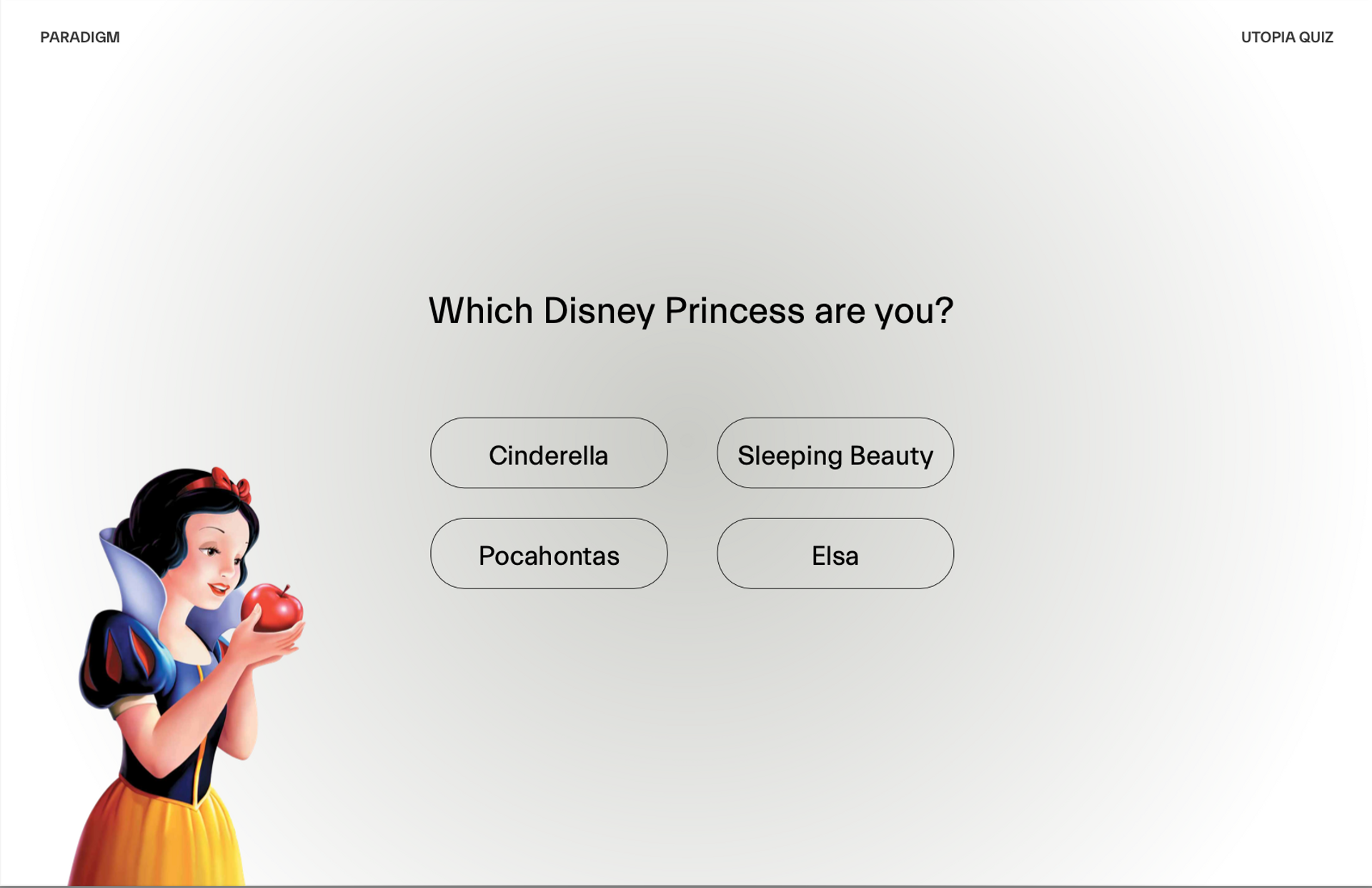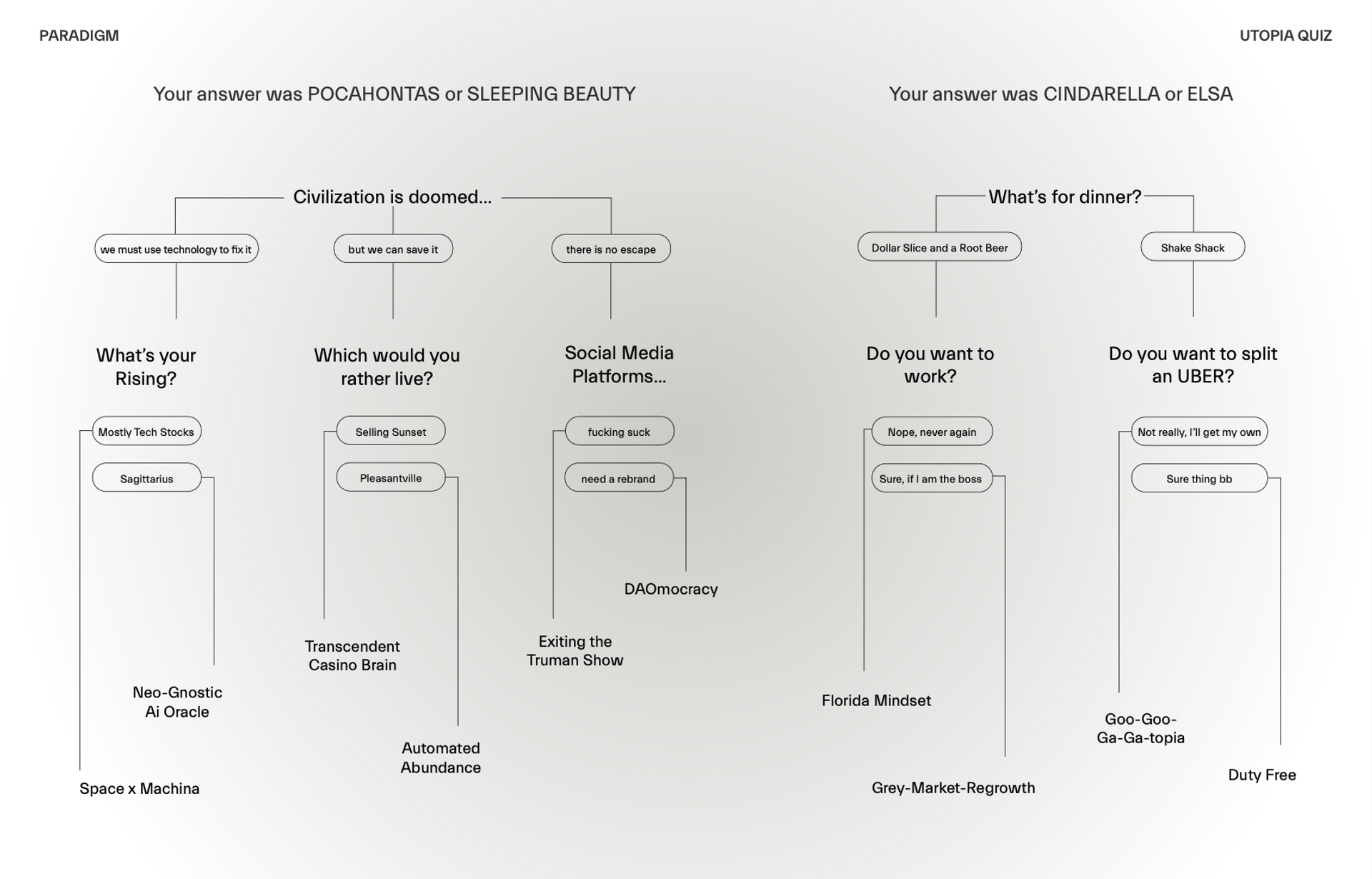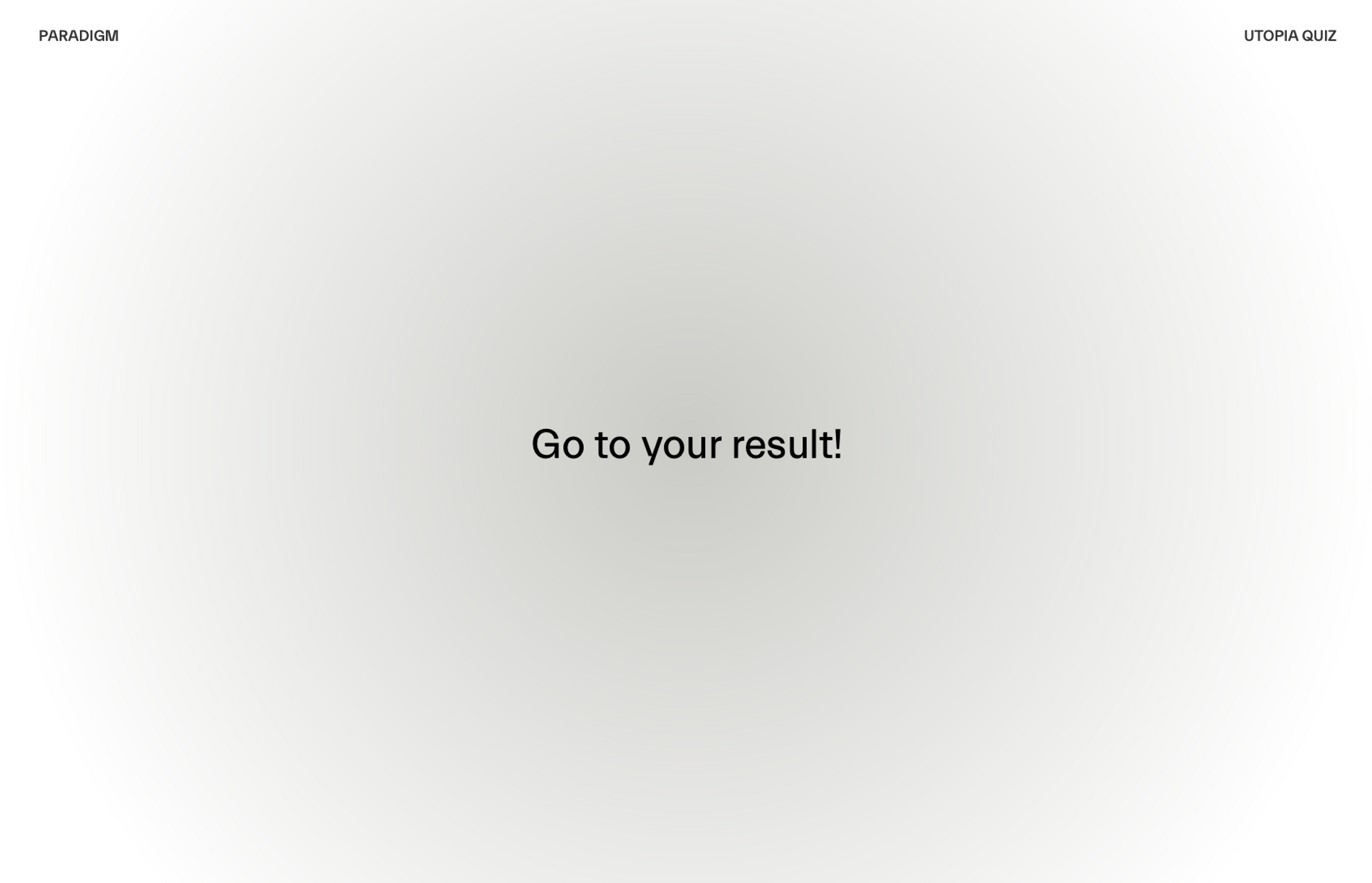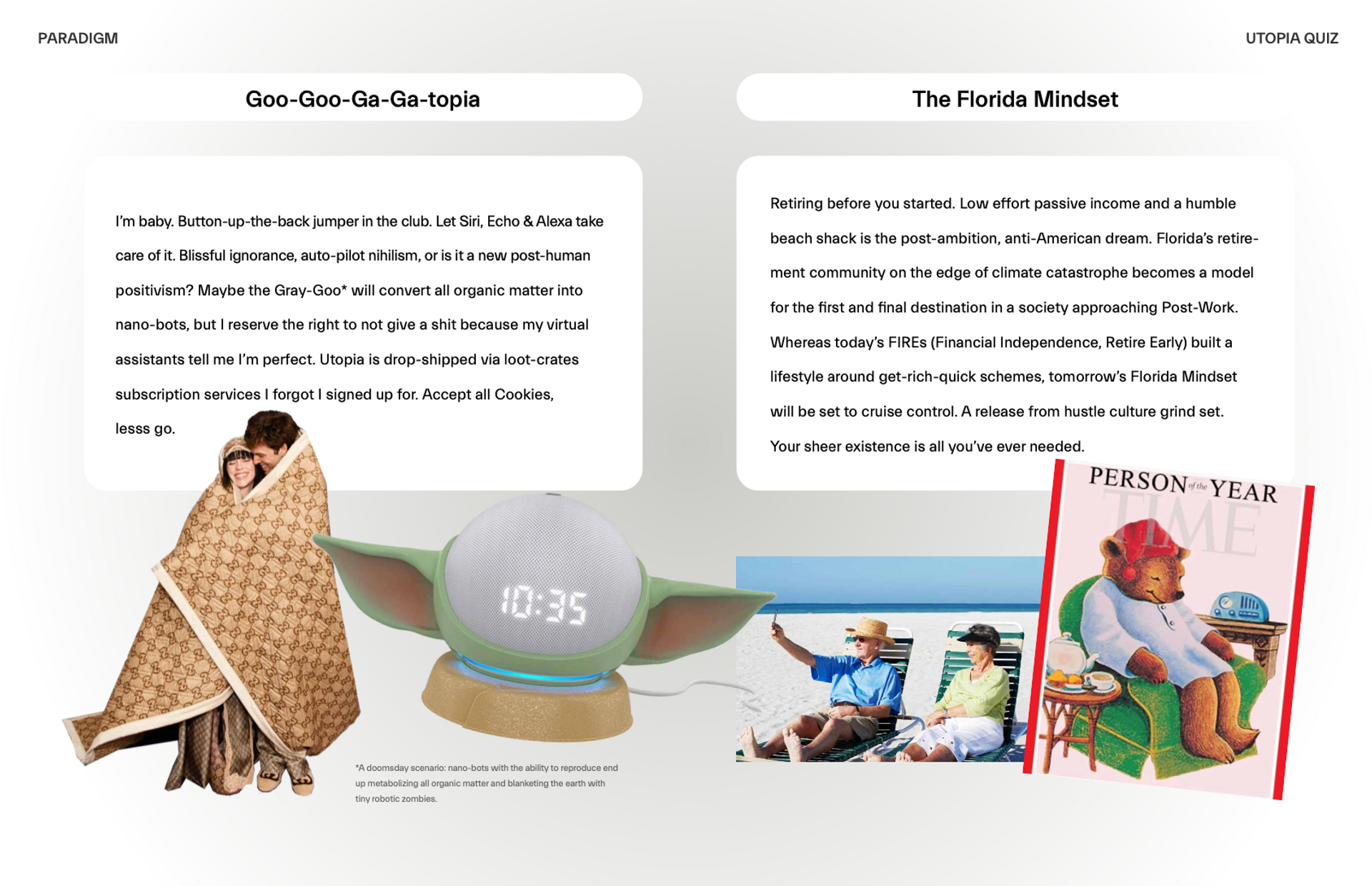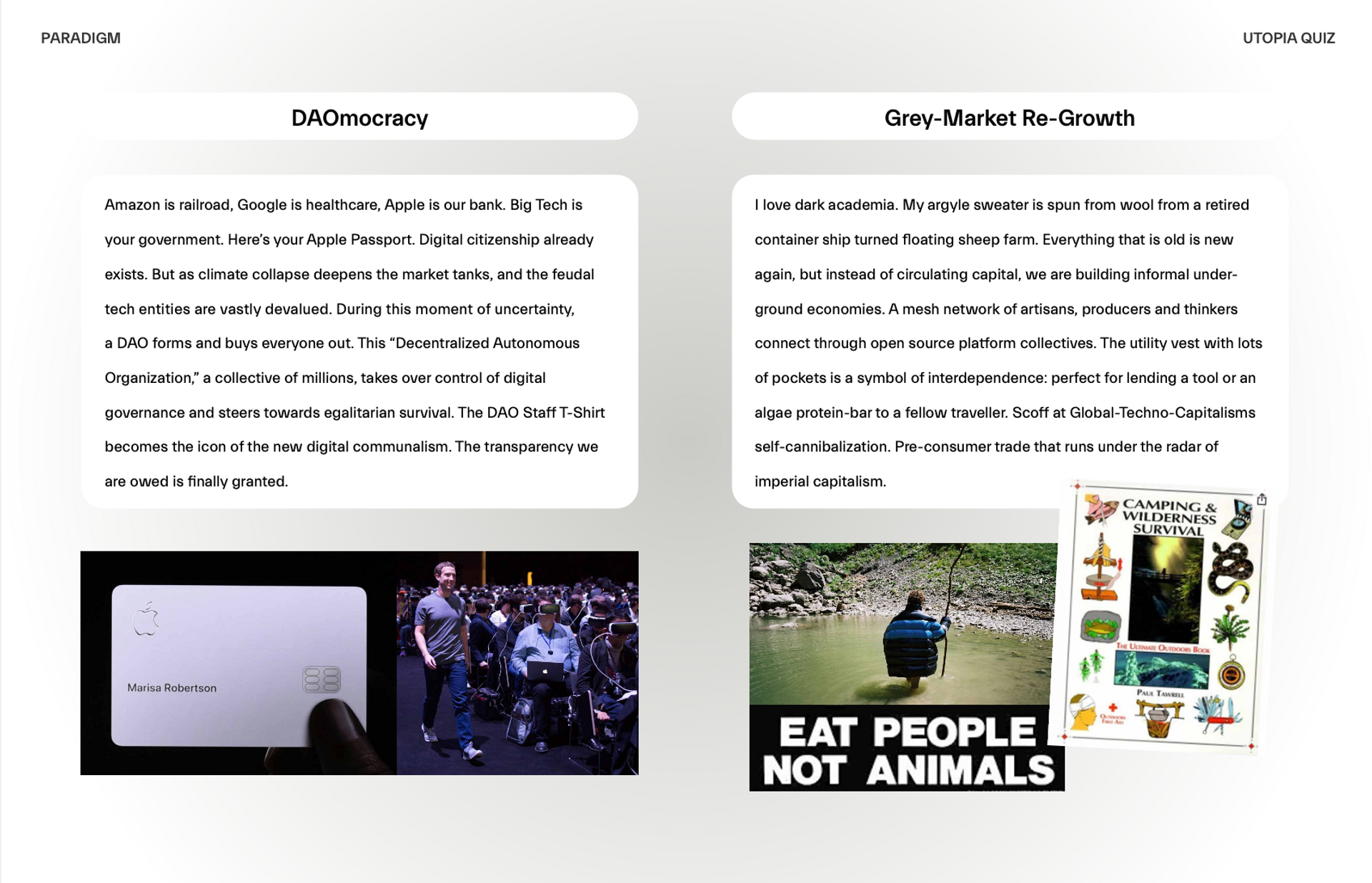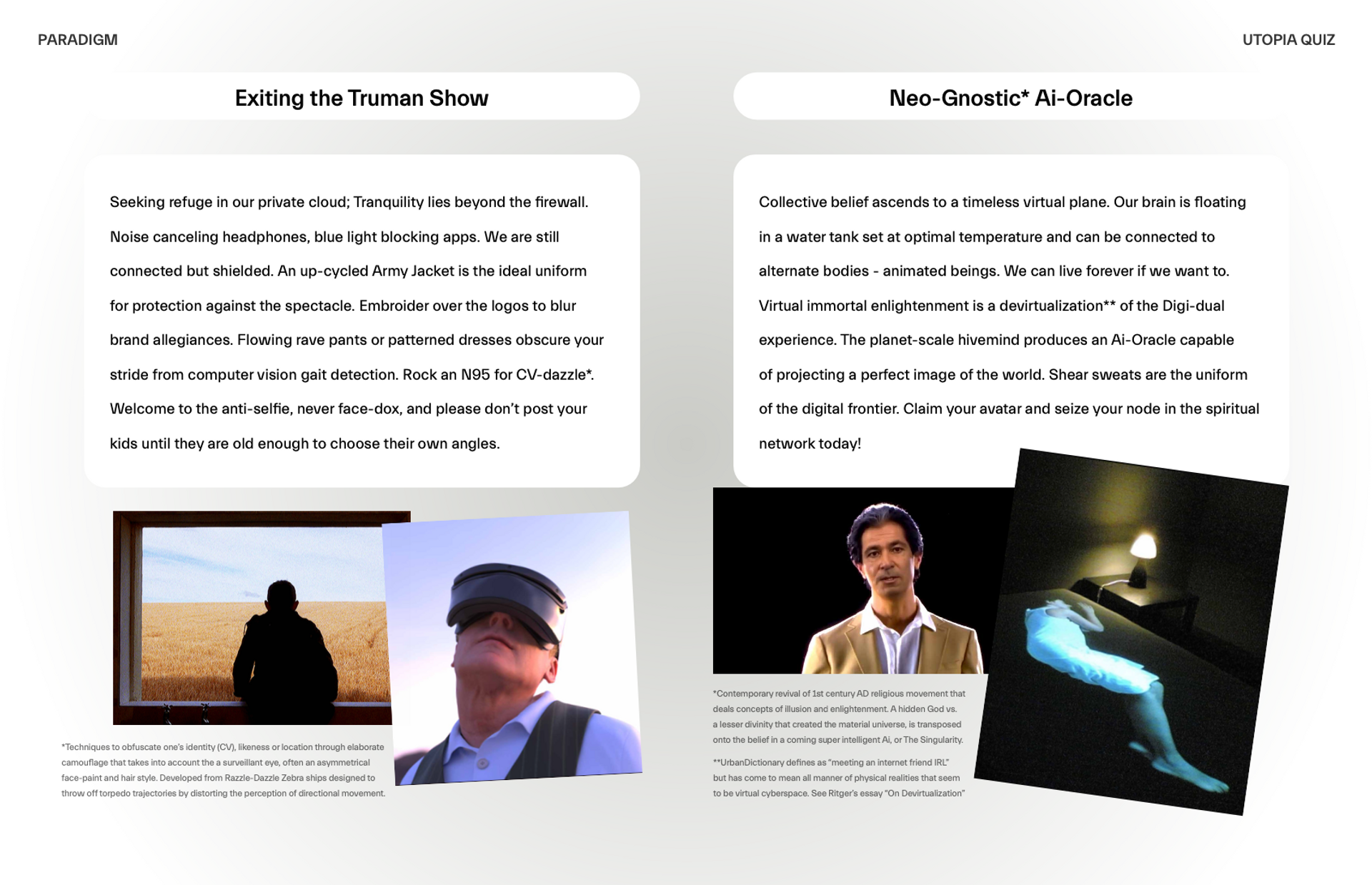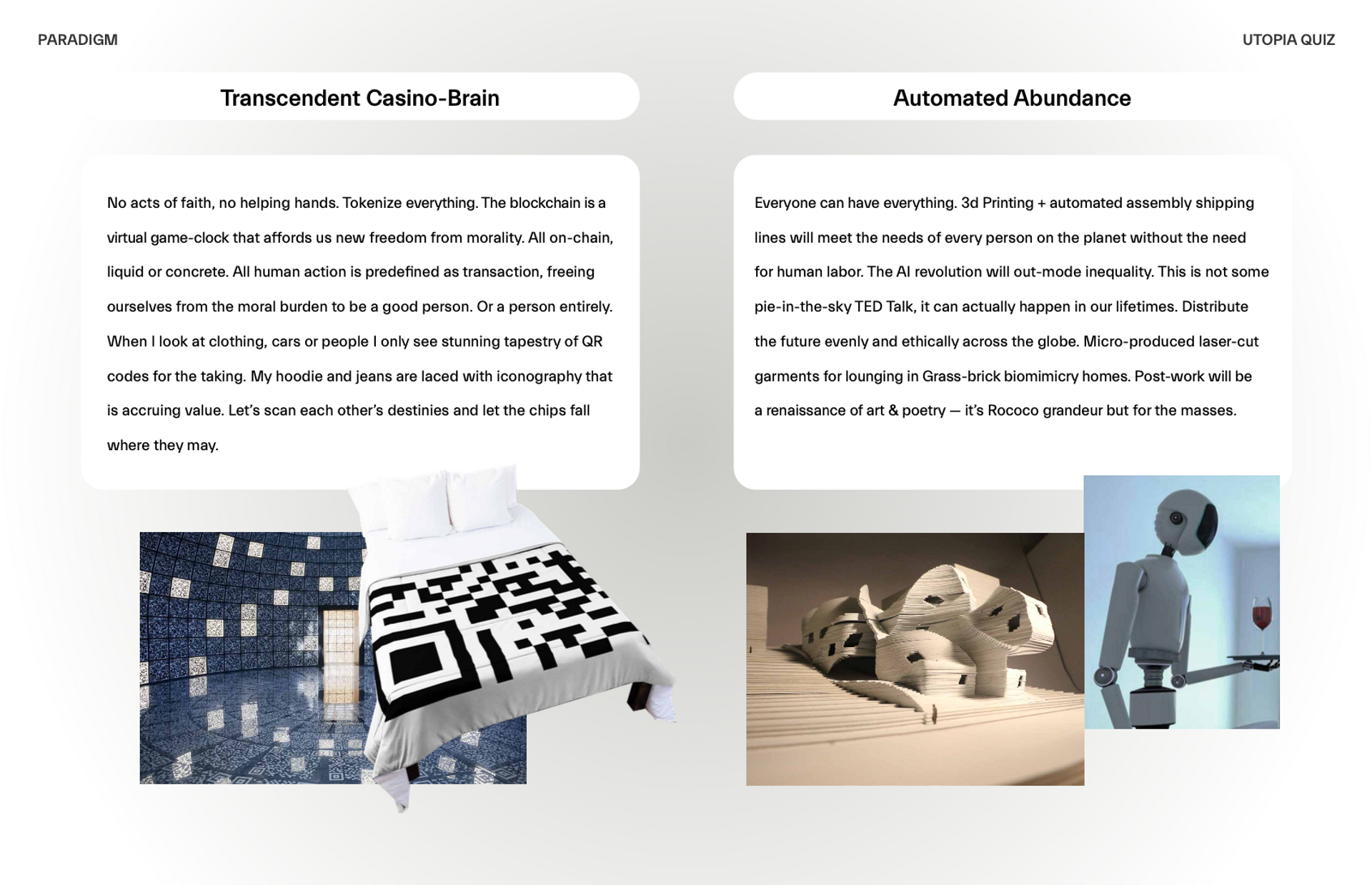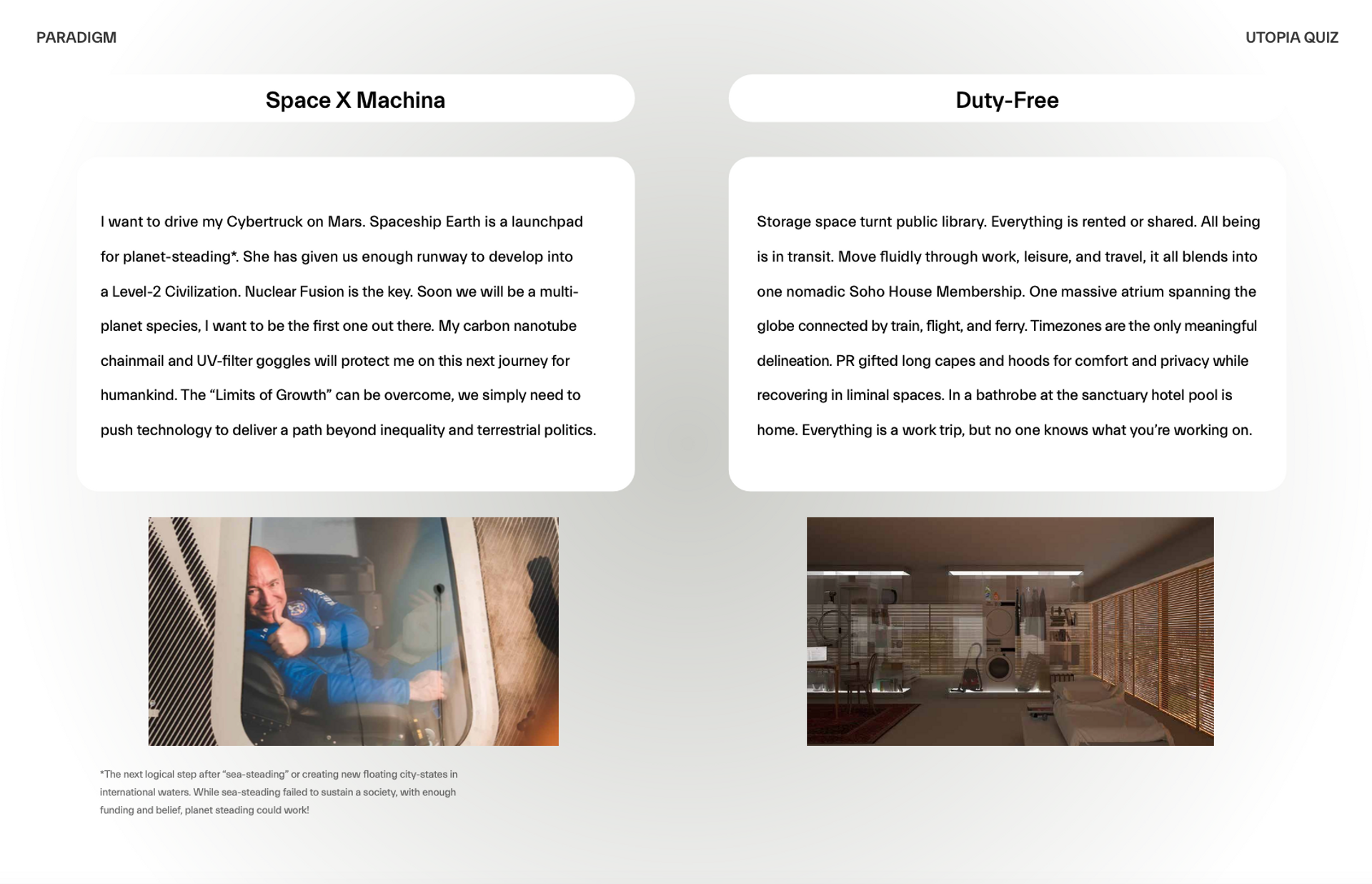What Future Do We Crave?: KATHARINA KORBJUHN’s Paradigm Trilogy
Taking form as a mostly digital publication—sometimes promoted anachronistically on objects such as matchbooks—Paradigm Trilogy is a limited series of three theme-driven issues, each pegged to its own city.
Editions one and two are sited in New York and Berlin, respectively. Number three, not yet released, will take Paris as its geo-conceptual hub. The first, titled “The Avant Garde and Kitsch,” puts a post-digital twist on Clement Greenberg’s famous thesis about modernism being an antidote to dumbed-down consumerism, narrated through white-paper-esque flow chart graphics, Warholian one-liners, and satirical photo shoots. The second, “Man vs. Machine,” dropped last month—not long after we all got access to ChatGPT—and considers future-forward creative leadership through the lens of 032c’s own hometown. Among its contents: a “utopia quiz” designed to show users the type of future they fundamentally crave.
Paradigm’s founder, Katharina Korbjuhn, is a creative director and brand consultant whose portfolio includes work for clients such as Tod’s, Schiaparelli, and Amazon’s Luxury Stores. She posits Paradigm as a guide to new creative practice seeking to locate the true power and purpose behind cultural production. Korbjuhn was quoted in a late 2021 edition of TRANSMISSIONS (somewhat controversially) addressing what people were calling “cringecore” at the time. In the article, she tells columnist Jordan Richman that she is “post-core”—which, as is revealed in this conversation with 032c editor-at-large Victoria Camblin, is about simultaneity, not suffixes.
VICTORIA CAMBLIN: Why a “trilogy”?
KATHARINA KORBJUHN: Straight from the ancient Greek playbook: “A series of three tragedies performed one after the other.” Three is the sacred number. The past, the present, and the future are reflected upon in each of the issues. I liked working with this constraint; it makes me think twice about what makes it into the issue. And frankly, I don’t think I’ll have anything left to say after the third one.
VC: Were all three themes laid out from the start? How did you peg the themes to the individual cities?
KK: I had a rough idea. Ultimately, I felt like writing about what I would speak about with industry friends in a way that felt free form conventional prose. It quickly became this thing that would give you a cultural snapshot, through bullet points that provide orientation within the landscape. We get lost in choosing models and hairstylists and in taking pictures. The idea was to provide a wake-up call about why we’re here and what our work means. I thought a lot about a return to morality. How I wish that we creatives were interested in world-building through our output, not in doom-spiraling further down into the artificial abyss, which I understand as a shared hallucination.
So, form followed function. Each issue’s design, distribution, and voice follow its respective line of thought. “Avantgarde & Kitsch” was set to focus on the past—on how art and artifice collapsed into one under market capitalism. The New York of Andy Warhol felt like the perfect backdrop to showcase this development. It’s a recap of how we got here. “Man vs. Machine,” is about the future, which felt pressing with the speedy take-over of AI from content curation to creation, for instance with the DALL-E Mini release. Berlin has forever been a place of utopia, romanticized by an international audience. Some of the most influential moments in contemporary culture have been by Berlin’s creatives. Think Niklas Bildstein Zaar’s sets for Balenciaga, or way back to the 2016 Berlin Biennale curated by DIS. It’s a place where a lot of future is happening now, and the artists in the issue––which features Loretta Fahrenholz, Simon Denny, Tobias Spichtig, and Analisa Teachworth––are free to imagine possible others.
While issues one and two have been thought-led, the third will focus on action in the present. Everything will be different.
VC: Will there be a post-trilogy version of Paradigm? What will it look like?
KK: Once the trilogy is completed, a print version will be available for sale. The third issue will live on, but I can’t say more about that yet.
VC: How does Paradigm congeal your other experiences in the fashion and creative industries? Do you make a distinction between those things?
KK: I don’t. Both inform each other. My writing influences client projects, and vice versa. When I am hired to think about strategic frameworks for brands, it inevitably becomes about the big picture questions—about culture, politics, or what it means to be human—and sense-making. Conversely, working in the industry as a creative director, which is the glue between creatives and the money people, affords me to see the bigger picture.
VC: Why “Paradigm”? Are you thinking of the “paradigm shift” popularized by Thomas Kuhn that is kind of associated with the first Dotcom bubble in the late 90s/Y2K?
KK: I was about to call it Genius, and Jordan Richman said that was a terrible idea. “Why not Paradigm?” I had already been sending emails from a Genius Trilogy account for a few months. Funnily, right after I changed the name, Kanye’s Netflix documentary jeen-yuhs: A Kanye Trilogy was released. Talk about the confluence of subculture and the subconscious.
VC: You were quoted in Jordan’s TRANSMISSIONS column saying you were “post-core.” It felt right. But of course, we’re still getting all these “cores.”
KK: “Core” represents centralization, therefore “core” is capitalism’s favorite brainchild—because an ultimatum, promoting its rule above all, sells. It operates on binary thought that mitigates the possibility of decentralization, simultaneity, and fluid identity. “Core” wants to commodify your identity and make you a good consumer. So, the theory of post-core has two meanings: the literal one and the conceptual one. Literally speaking, being post-core replaces definition with the acknowledgment that everything is always present at the same time: the good, the bad, the punk, the prude. Conceptually, the idea of the post-core frames the current state of identity formation, in which the individual seeks to accumulate as many possible contradictions while not associating the self with any of them. Dasha Nekrasova, for example, capitalizes on this type of contrarian sex appeal that ultimately is system-affirming, not system-opposing. Throwing around more “cores”—including “post-core”—to frame culture perpetuates capitalist indoctrination, made visible by how we speak. A more compassionate way to look at it is that we may need more time to move to the next phase of collective identity and toward a truly post-capitalistic system. Some current “cores,” such as Shumon Basar’s “endcore,” point to the same end.
VC: What else are you/we “post”?
KK: Coining terms, LVMH, and Beyonce.
VC: What did you get on the utopia quiz?
KK: I’m obviously Neo Gnostic AI Oracle. Mine is a future in which my brain is stored in a water tank, and I can download myself into all sorts of beings. Very in control, very me. Less Harry Styles’ “Don’t Worry Darling” and more Avatar: The Way of Water, if that makes sense.
VC: Are you using AI? Do you have an Artificial Intelligence anecdote?
KK: My friends are having Chat GPT write their MIT applications. I’m more pen and paper. But during the pandemic, which I spent in suburban America, I came across some peanuts on a shelf. Minutes later, the Instagram algorithm presented me with an ad for an identical can of Blue Diamond Peanuts. I still don’t understand how, but the thing read my mind. It made me never want to buy Blue Diamond Peanuts, ever.
VC: Date, time, place of birth—do you ever ask people for those stats? Are you “woo”?
KK: I am Libra, Capricorn rising, Leo moon. sln.me is my first destination before any date, and my annual astrology reading with the French psychic that advises LVMH’s CEOs on their decision-making is sacred. Even the most rational of decisions can do with a little bit of the auratic. Isn’t all that stuff about believing in a higher force and, ultimately, about faith? I try to be zero cynical, which feels pretty punk in the current landscape.
VC: Are you willing to share any predictions for the rest of the year, astrological or otherwise?
- The suburban dream is back.
- A non-Silicon Valley is founded on the shoulders of ketamine therapy.
- No one cares about TikTok anymore.
- Elon Musk engineers another four children with undisclosed mothers and drops out of Twitter.
- Pamela Anderson and Tommy Lee reunite.
Download the first two installments of PARADIGM TRILOGY here.

